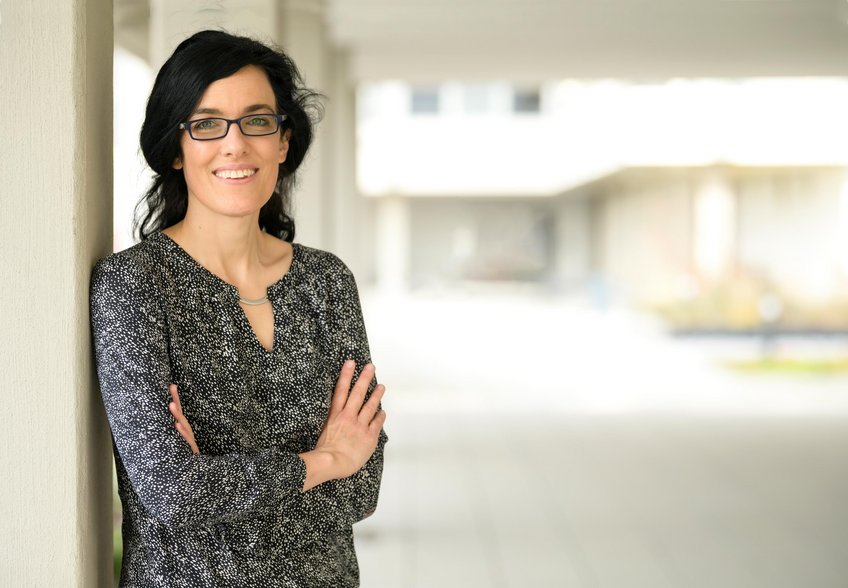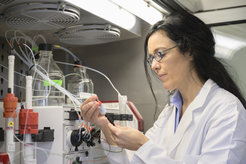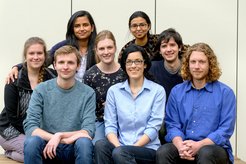
Sonja Lorenz
Barcodes for proteins
Our research group leader Sonja Lorenz studies particular, small proteins that have the power to rule all the others.
When Sonja Lorenz’ team meets for its ‘gourmet nights’, the table is richly laden with international dishes. It reflects the group’s many nationalities. Lorenz has traveled the world. Born in Neustadt an der Weinstraße, she studied biochemistry in Regensburg, spending one year of her undergraduate studies at the University of California, Berkeley (US). After some time in Cambridge (England), she earned her PhD at the neighboring University of Oxford. “While abroad, I learnt how inspiring and enriching it is for science when people from different cultural backgrounds work together,” the biochemist explains. “That’s why I am particularly happy that my lab is internationally so diverse. We have recruited lab members from Germany, New Zealand, India, Scotland, and Costa Rica.”
In March 2021, the research group leader and her team moved from the University of Würzburg to our institute in Göttingen. Here, Lorenz can expand the repertoire of methods she uses to investigate the ubiquitin system. Hold on. The ubiqui... what?
Ubiquitin – tiny but mighty
Ubiquitin is a small protein that ubiquitously occurs in cells that have a nucleus. There, it acts as a key control element for other proteins. Ubiquitin can be thought of as a molecular barcode that is reversibly attached to target proteins. The information contained in the barcode determines the fate and functions of the modified proteins. Ubiquitin can not only affect the proteins’ lifetimes and cellular localization, but also their conformations, catalytic activities, or interactions with protein binding partners. The ubiquitin barcode is therefore extremely versatile and can control the properties of proteins at different levels.

Ubiquitin is attached to target proteins by enzymes called ubiquitin ligases. “Ubiquitin can decorate target proteins not only as a single molecule, but also as multi-membered chains of different linkage types,” Lorenz tells. “This opens up countless possibilities for how the barcode may look like, each of which transmits specific information or tasks to the tagged protein and its interactors. The ubiquitin system thus holds huge regulatory potential.”

With her research group, the biochemist wants to find out how ubiquitin ligases manage to mark specific proteins with the correct barcodes at the correct time and place. Notably, the enzymes ought to recognize not only their designated target proteins, but also the correct attachment points. However, cells are packed with a vast number of proteins. How do ubiquitin ligases recognize their target proteins within this maze? Furthermore, which factors regulate the activities and specificities of ubiquitin ligases spatiotemporally?
Together with colleagues from the University of California, Lorenz made a surprising discovery. “Typically, enzymes are equipped with the features they require to perform their tasks. We found that some ubiquitination enzymes depend on ubiquitin to achieve specificity,” the scientist says. Ubiquitin can thus actively contribute to its own attachment to target proteins. This principle of substrate-assisted catalysis had previously been described for other processes, but was not known to apply to ubiquitination enzymes.
Music and sports and writing and science
In addition to her scientific career, Lorenz has many other interests. “I have always had hobbies that I devote a larger part of my free time to,” she states. Since her school days, the researcher has enjoyed writing both scientific texts and short stories. Science communication is particularly close to her heart. In Cambridge, she completed an internship with the journal Science, and published popular scientific articles at various universities.
Music and sports also belong to Lorenz’ favorites. In Würzburg, she sang for years in an award-winning chamber choir, and during her doctoral studies at Oxford, she enjoyed participating in tournaments and team events as a member of the university’s varsity tennis team. “Here in Göttingen, I would love to play tennis again, but still have to assess what is feasible time-wise. In any case, it’s important for me to maintain a certain width of interests in my life that includes sports and culture in addition to science.”
Getting off to a flying start in Göttingen
Lorenz became excited about the natural sciences at an early age. Past and present, she has been fascinated by the interfaces between different disciplines. “It is the diversity of concepts and methods that merge in my field of research and raise new opportunities that make science so incredibly exciting for me.” This potential for synergies also convinced the biochemist to move to our institute in March of this year.
The institute, she says, is a world-class address for all areas relevant to her research. For example, thanks to the infrastructure, equipment, expertise, and collaborations at the MPI-BPC, the research group can now expand its range of approaches, particularly to cryo-electron microscopy, and interrogate new model systems. “After six months at the institute, we already have some exciting results. I feel that our research has risen to another level, and my team has received an enormous motivation boost.”
According to Lorenz, there is another contributing factor that frees valuable time for research: “The administration at the institute is extremely well organized and takes a lot of bureaucracy off my hands.” She would also like to express her sincere thanks to the workshops and services, which provided highly competent and flexible support in setting up her lab.
“I am very much looking forward to the coming years here at the MPI-BPC. We have already deciphered the structural mechanisms of individual elements in the ubiquitin system. Now we are aiming to integrate these mechanisms into macromolecular complexes and cellular signaling networks.” To this end, the group leader will increasingly investigate how her findings can be transferred from the test tube to cell cultures. Evidently, Lorenz’ research program is just as diverse as the selection of dishes at her team’s gourmet nights.

Five questions to Sonja Lorenz
Which other job could you imagine doing?
Writer: I imagine creating and diving into worlds of one’s own devising to be similarly fascinating as scientific research.
Which country would you like to visit?
One of my long-cherished dreams is to explore the Galapagos Islands in the footsteps of Charles Darwin.
Which famous person – from the past or present – would you like to meet?
I would love to hear firsthand about the mysterious works of a surrealist like Remedios Varo.
What would you do if you had more time?
I would open a ‘music salon’ at home, where people meet on the weekends for chamber music and cake.
About what topic could you give a 30-minute presentation without any preparation?
Ubiquitin, of course!


